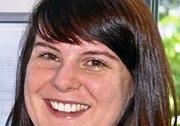Brainiac wins Fulbright
She's a whizz at maths, has a degree in fine arts and is studying for a doctorate in neuroscience: now Angela Langdon has won a prestigious scholarship to develop a mathematical model of the brain.
She's a whizz at maths, has a degree in fine arts and is studying for a doctorate in neuroscience: now Angela Langdon has won a prestigious scholarship to develop a mathematical model of the brain.

She's a whizz at maths, has Honours degrees in physics and fine arts and is studying for a doctorate in neuroscience: now Angela Langdon has won a prestigious scholarship to help her develop a mathematical model of the brain.
The talented UNSW student, who is based in the Faculty of Medicine, has been awarded a 2010 Fulbright Postgraduate Scholarship that will allow her to spend a year at the Centre for Neural Science, New York University, to further pursue her research into the functioning of the human brain.
Her successful studies at UNSW also earned her an Australian Bicentennial Scholarship: that award enabled her to travel to Britain and work at the University of Nottingham, in the School of Mathematical Sciences.
"Despite recent advances in the non-invasive measurement of brain activity in humans, a comprehensive understanding of the biophysical processes that give rise to cognitive functions, such as perception, is still lacking," says Ms Langdon, one of 25 Australians to be recognised as Fulbright Scholars in 2010.
"I'll be working with Professor John Rinzel at New York University, to undertake a collaborative project in the field of computational neuroscience. We'll work on developing mathematical models that describe how patterns of brain activity change in response to incoming sensory information and give rise to perception. Such investigations are at the forefront of interdisciplinary research in neuroscience."
Professor Philip Mitchell, Head of the School of Psychiatry at UNSW, said the Fulbright provides a "marvellous opportunity" for Angela to enhance her research skills in a leading US laboratory.
"Her cutting-edge research in computational neuroscience has great potential for enhancing our understanding of the causes of common psychiatric disorders such as depression and schizophrenia," he said.
Read the full story here.
Media contacts: Bob Beale, UNSW Faculty of Science | 0411 705 435 | bbeale@unsw.edu.auSteve Offner, UNSW Media Office | 02 9385 8107 | s.offner@unsw.edu.au